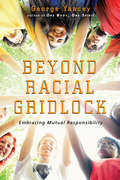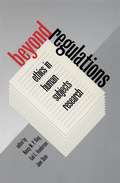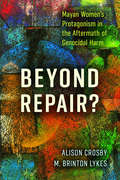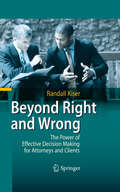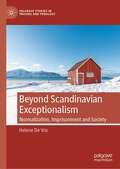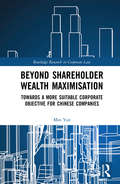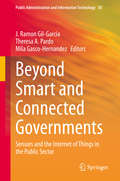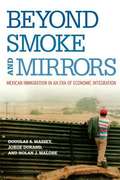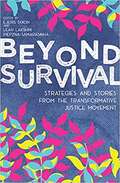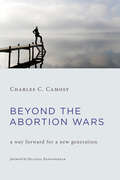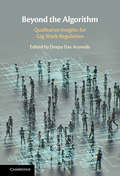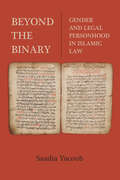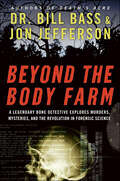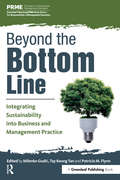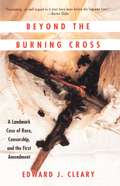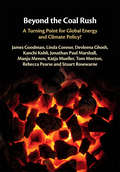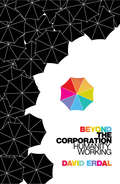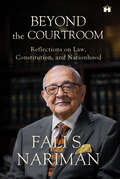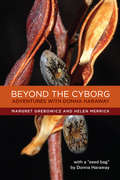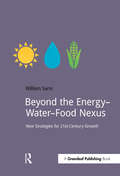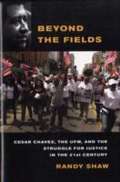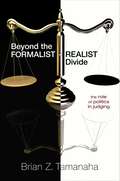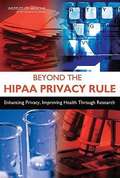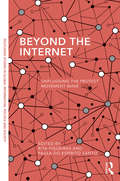- Table View
- List View
Beyond Racial Gridlock: Embracing Mutual Responsibility
by George YanceyChristians have struggled with racial issues for centuries, and often inadvertently contribute to the problem. Many proposed solutions have been helpful, but these only take us so far. Adding to this complex situation is the reality that Christians of different races see the issues differently. Sociologist George Yancey surveys a range of approaches to racial healing that Christians have used and offers a new model for moving forward. The first part of the book analyzes four secular models regarding race used by Christians (colorblindness, Anglo-conformity, multiculturalism and white responsibility) and shows how each has its own advantages and limitations. Part two offers a new "mutual responsibility" model, which acknowledges that both majority and minority cultures have their own challenges, tendencies, and sins to repent of, and that people of different races approach racial reconciliation and justice in differing but complementary ways. Yancey's vision offers hope that people of all races can walk together on a shared path--not as adversaries, but as partners.
Beyond Regulations
by Gail E. Henderson Nancy M. King Jane SteinAcross a broad range of disciplines--in medicine, social science, and the humanities--researchers, scholars, teachers, and administrators increasingly are looking for new ways to approach ethical issues in research with human subjects. Questions about how relationships between funders and researchers should affect research design, for example, or whether the potential benefits of research can outweigh the importance of its subjects' interests are inadequately addressed by the prevailing, regulation-based research ethics paradigm. This book constitutes a reexamination of research ethics. It combines case studies and commentaries by a multidisciplinary group of scholars and researchers to explore such topics as informed consent, conflict of interest, confidentiality, and research on illegal behavior. All human subjects research takes place within complex social, cultural, and political contexts, the contributors argue. Increased consideration of the relationships between researchers and their subjects, funders, and institutions within these contexts will facilitate research that is sensitive and responsible as well as scientifically fruitful.Beyond Regulations features a keynote essay by Ruth Macklin. Other contributors are Marcela Aracena Alvarez, Jorge Balan, B. Susan Bauer, Alan F. Benjamin, Lynn Blanchard, Allan M. Brandt, J. Pat Browder, Barbara Entwisle, Sue E. Estroff, Renee C. Fox, Lara Freidenfelds, Gail E. Henderson, Nancy M. P. King, Loretta M. Kopelman, Ernest N. Kraybill, Barry M. Popkin, Silvina Ramos, Desmond K. Runyan, Jane Stein, Ronald P. Strauss, Keith A. Wailoo, and Cynthia Waszak.Across a broad range of disciplines--in biomedicine, the social sciences, and the humanities--researchers, scholars, administrators, and teachers increasingly struggle with questions of ethics in research with human subjects. All research takes place in complex social, cultural, political, and economic contexts; yet the prevailing principle-based research ethics paradigm does not adequately account for them. This book reexamines research ethics using a new relationships paradigm. Through in-depth cases, commentaries, and essays, a multidisciplinary group of scholars and researchers addresses informed consent, conflict of interest, confidentiality, and other issues, considering questions like: What relationships should researchers have with their subjects' communities? When researchers and subjects have different views about research, who should have control? How should relationships between funders and researchers affect research design? Can research be so potentially beneficial that its importance outweighs the interests of subjects? Examining the relationships between researchers and subjects, communities, funders, and institutions--including considerations of authority and voice--can facilitate human subjects research that is morally sensitive and responsible as well as scientifically fruitful.
Beyond Repair?: Mayan Women’s Protagonism in the Aftermath of Genocidal Harm (Genocide, Political Violence, Human Righ)
by Alison Crosby M. Brinton LykesBeyond Repair? explores Mayan women’s agency in the search for redress for harm suffered during the genocidal violence perpetrated by the Guatemalan state in the early 1980s at the height of the thirty-six-year armed conflict. The book draws on eight years of feminist participatory action research conducted with fifty-four Q’eqchi’, Kaqchikel, Chuj, and Mam women who are seeking truth, justice, and reparation for the violence they experienced during the war, and the women’s rights activists, lawyers, psychologists, Mayan rights activists, and researchers who have accompanied them as intermediaries for over a decade. Alison Crosby and M. Brinton Lykes use the concept of “protagonism” to deconstruct dominant psychological discursive constructions of women as “victims,” “survivors,” “selves,” “individuals,” and/or “subjects.” They argue that at different moments Mayan women have been actively engaged as protagonists in constructivist and discursive performances through which they have narrated new, mobile meanings of “Mayan woman,” repositioning themselves at the interstices of multiple communities and in their pursuit of redress for harm suffered.
Beyond Right and Wrong: The Power of Effective Decision Making for Attorneys and Clients
by Randall KiserThis book guides attorneys and clients through legal decision making. It analyzes 11,306 attorney-client decisions in actual cases and summarizes decades of research regarding judge, jury, litigant and attorney decision making. To explain why many litigation outcomes are suboptimal, the book describes the psychological and institutional factors that impede sound decision making. The roles of attorneys and clients in legal decision making and the legal malpractice and disciplinary consequences of ineffective legal representation also are discussed. To rapidly promote better financial outcomes in civil litigation and to assist attorneys and clients in becoming expert decision makers, the book presents more than 65 ideas, methods and systems for improving personal and group decision making.
Beyond Scandinavian Exceptionalism: Normalization, Imprisonment and Society (Palgrave Studies in Prisons and Penology)
by Helene De VosThis book explores how prison life is normalized in different countries, with a critical and detailed look at ‘Scandinavian exceptionalism’ — the idea that Scandinavian prisons have exceptionally humane conditions — and compares these prisons to ones in Belgium. It provides a more nuanced, systematic and contextualized comparison of normalization in two countries. Through analyzing policy and legislative documents, participant observation and interviews, it seeks to understand how normalization is implemented differently in prison legislation, policies and practices and compares the two societies for context. It also considers the material prison environment, security, the social environment and the use of time in prison. It provides insights into how normalization can be successfully and holistically implemented in both policy and practice, to contribute to a more ‘pure’ form of liberty deprivation as punishment without too many unintended effects.
Beyond Shareholder Wealth Maximisation: Towards a More Suitable Corporate Objective for Chinese Companies (Routledge Research in Corporate Law)
by Min YanThe corporate objective, namely, in whose interests a company should be run, is the most important theoretical and practical issue confronting us today, as this core objective animates or should animate every decision a company makes. Despite decades of debate, however, there is no consensus regarding what the corporate objective is or ought to be, but clarity on this issue is necessary in order to explain and guide corporate behaviour, as different objectives could lead to different analyses and solutions to the same corporate governance problem. In addition to the study on the corporate objective in Anglo-American jurisdictions, the discussion of this topic in the context of China is also very important on the grounds that China has become the second largest economy in the world and is playing an increasingly significant role in global affairs. Though a socialist state, China has also been relying heavily on the corporate vehicle as the most important business organisational form to ensure its rapid economic development since its market reforms in 1978. Adolf Berle and Gardiner Means’s observation made over eight decades ago that large public companies dominate the world remains true today, not only in the West but also in China. The regulation and governance of such companies will have a material impact on the further development of the Chinese economy, which could in turn directly affect the world economy. Company law and corporate governance therefore receive much attention and have become a vital issue in China. Although the current focus is primarily on corporate performance, the fundamental question at the heart of corporate governance, namely the corporate objective, is still unresolved. Contrary to the widely held belief that the corporate objective should be maximising shareholder wealth, this book seeks to demonstrate that the shareholder wealth maximisation approach is both descriptively inaccurate and normatively unsuitable. As an antithesis to it, stakeholder theory generally develops to be a more suitable substitute. Justifications and responses to its main criticisms are offered from descriptive, normative and instrumental aspects, whilst new techniques of balancing competing interests and more workable guidance for directors’ behaviour are brought forward as essential modifications. Along with the unique characteristics of socialist states, the stakeholder model is expected to find solid ground in China and guide the future development of corporate governance. This book will be important and useful to researchers and students of corporate law, corporate governance, business and management studies.
Beyond Smart and Connected Governments: Sensors and the Internet of Things in the Public Sector (Public Administration and Information Technology #30)
by J. Ramon Gil-Garcia Theresa A. Pardo Mila Gasco-HernandezThis book provides a comprehensive introduction to the study of sensors and the Internet of Things (IoT) from a government and public policy perspective. Since 2011, federal spending on IoT has been growing at a compound annual rate of ten percent. New technologies, such as sensors, and new kinds of data, such as big data, are creating new ways to systematically capture data and to use it to respond to complex problems. Some of these new technologies and applications have been identified and studied in recent literature in terms of their relevance to government. This volume adds to the literature by presenting sound theories and concepts for understanding the opportunities and challenges governments face when seeking to improve public services and government operations through the use of IoT. It also includes innovative methodologies for building understanding of the potential of a smart and connected government. In addition, the book offers relevant case studies and practical recommendations for the development, management, and evaluation of public policies and government programs.
Beyond Smoke and Mirrors: Mexican Immigration in an Era of Economic Integration
by Douglas Massey Jorge Durand Nolan J. MaloneIn a very real way, the Mexico-U.S. migration system functioned as a complicated piece of machinery in the years from 1965 through 1986. It was composed of a set of delicately balanced social and economic processes that had emerged gradually over many years in response to specific changes in the political economies of Mexico and the United States. Cross-border population movements had a characteristic form, and over time they acquired a relatively stable structure and a well- defined geographic organization. Migration between Mexico and the United States followed predictable paths in accordance with well-established scientific principles. Just as it is not advisable to take a wrench to a precision clock if one is not a qualified clockmaker, it is not wise to pull policy levers if one has no real conception of how the underlying system functions. Yet this is exactly what happened beginning in 1986, when the U.S. Congress and successive presidents presided over a series of legislative and bureaucratic changes that fundamentally changed the rules under which the Mexico-U.S. migration system operated.
Beyond Survival: Strategies And Stories From The Transformative Justice Movement
by Ejeris Dixon Leah Lakshmi Piepzna-SamarasinhaTransformative justice seeks to solve the problem of violence at the grassroots level, without relying on punishment, incarceration, or policing. Community-based approaches to preventing crime and repairing its damage have existed for centuries. However, in the punative atmosphere of contemporary criminal justice systems, they are often marginalized and operate under the radar. Beyond Survival puts these strategies front and center as real alternatives to today’s failed models of confinement and “correction.” In this collection, a diverse group of authors focuses on concrete and practical forms of redress and accountability, assessing existing practices and marking paths forward. They use a variety of forms—from toolkits to personal essays—to delve deeply into the “how to” of transformative justice, providing alternatives to calling the police, ways to support people having mental health crises, stories of community-based murder investigations, and much more. At the same time, they document the history of this radical movement, creating space for long-time organizers to reflect on victories, struggles, mistakes, and transformations.
Beyond the Abortion Wars: A Way Forward for a New Generation
by Charles C. CamosyCuts through the mass confusion surrounding abortion and lays out solid common ground The abortion debate in the United States is confused. Ratings-driven media coverage highlights extreme views and creates the illusion that we are stuck in a hopeless stalemate. In this book Charles Camosy argues that our polarized public discourse hides the fact that most Americans actually agree on the major issues at stake in abortion morality and law. Unpacking the complexity of the abortion issue, Camosy shows that placing oneself on either side of the typical polarizations -- pro-life vs. pro-choice, liberal vs. conservative, Democrat vs. Republican -- only serves to further confuse the debate and limits our ability to have fruitful dialogue. Camosy then proposes a new public policy that he believes is consistent with the beliefs of the broad majority of Americans and supported by the best ideas and arguments about abortion from both secular and religious sources.
Beyond the Algorithm: Qualitative Insights for Gig Work Regulation
by Deepa Das AcevedoIn Beyond the Algorithm: Qualitative Insights for Gig Work Regulation, Deepa Das Acevedo and a collection of scholars and experts show why government actors must go beyond mass surveys and data-scrubbing in order to truly understand the realities of gig work. The contributors draw on qualitative empirical research to reveal the narratives and real-life experiences that define gig work, and they connect these insights to policy debates being fought out in courts, town halls, and even in Congress itself. The book also bridges academic and non-academic worlds by drawing on the experiences of drivers, journalists, and workers' advocates who were among the first people to study gig work from the bottom up. This book is a must-read for anyone interested in gig work, the legal infrastructure surrounding it, and how that infrastructure can and must be improved.
Beyond the Binary: Gender and Legal Personhood in Islamic Law
by Saadia YacoobA free ebook version of this title is available through Luminos, University of California Press's Open Access publishing program. Visit www.luminosoa.org to learn more. One of the most hotly debated issues in contemporary Muslim ethics is the status of women in Islamic law. Whereas Muslim conservatives argue that gender-differentiated legal rulings reflect complementary gender roles, Muslim feminists argue that Islamic law has subordinated women and is thus in need of reform. The shared assumption on both sides, however, is that gender fundamentally shapes an individual’s legal status. Beyond the Binary explores an expansive cross section of topics in ninth- to twelfth-century Hanafi legal thought, ranging from sexual crimes to consent to marriage, to show that early Muslim jurists imagined a world built not on a binary distinction between male and female but on multiple intersecting hierarchies of gender, age, enslavement, lineage, class, and other social roles. Saadia Yacoob offers a restorative reading of Islamic law, arguing that its intersectional and relational understanding of legal personhood offers a productive space for Muslim feminists to move beyond critique and instead think with and through the Islamic legal tradition.
Beyond the Body Farm: A Legendary Bone Detective Explores Murders, Mysteries, and the Revolution in Forensic Science
by Bill Bass Jon JeffersonAn “excellent” collection of case studies and stories from the forensic anthropologist who founded Tennessee’s “Body Farm” (Charleston Post & Courier).A pioneer in forensic anthropology, Bill Bass created the world’s first laboratory dedicated to the study of human decomposition—three acres on a Tennessee hillside where human bodies are left to the elements. His research at the Body Farm has revolutionized the field, helping crack cold cases and pinpoint time of death. But during a forensics career that spans half a century, Bass’s work has ranged far beyond the gates of the Body Farm. In this riveting book, the bone sleuth explores the rise of modern forensic science, using fascinating cases he’s worked on to take readers into the real world of C.S.I.Some cases rely on the simplest of tools and techniques, such as reassembling—from battered torsos and a stack of severed limbs—eleven people hurled skyward by an explosion at an illegal fireworks factory. Other cases hinge on sophisticated techniques Bass couldn’t have imagined when he began his career: harnessing scanning electron microscopy to detect trace elements in knife wounds, or extracting DNA from a long-buried corpse, only to find that the murder victim may have been mistakenly identified a quarter-century before.Beyond the Body Farm follows Bass as he explores the depths of a lake with a twenty-first-century sonar system in search of an airplane that vanished thirty-five years ago; exhumes a fifties pop star to determine what injuries he suffered in the plane crash that killed three rock and roll legends; and works to decipher an ancient Persian death scene. Witty and engaging, Bass dissects the methods used by homicide investigators every day on an extraordinary journey into the high-tech science that it takes to crack a case.“Case studies and anecdotes from the field of corpse identification [with] careful attention to detail and the occasional darkly humorous aside.” —Publishers Weekly“The real crimes and mysteries here are just as or more intriguing than any fictional crime drama . . . offers a real-life understanding of forensic anthropology and the science behind it.” —Knoxville News-Sentinel
Beyond the Bottom Line: Integrating Sustainability into Business and Management Practice
by Milenko Gudić Tay Keong Tan Patricia M. FlynnBeyond the Bottom Line: Integrating the UN Global Compact into Management Practice is the first book to look at how the Ten UN Global Compact Principles and the sustainability agenda can be incorporated into business practice. The UN Global Compact is the largest corporate sustainability initiative and, with over 12,000 participating organizations, provides a major influence on global business sustainability practices. Its mission is to guide organizations in how to (1) do business responsibly by aligning their strategies and operations with Ten Principles on human rights, labour, environment and anti-corruption; and (2) take strategic actions to advance broader societal goals, such as the UN Sustainable Development Goals, with an emphasis on collaboration and innovation.This new book addresses head-on some of the most persistent managerial challenges faced by businesses and organizations today. To what extent are businesses able to practice responsible management with regard to the Ten Principles of the UN Global Compact? How can managers of organizations comprehensively and pragmatically address the risks and responsibilities concerning these complex and changing issues in their policies and practice? It also offers a platform for academics to confront some of the most intriguing intellectual challenges on this topic.
Beyond the Burning Cross: A Landmark Case of Race, Censorship, and the First Amendment
by Edward J. ClearyHere is the story of the controversial landmark decision by the lawyer who took the case all the way to the Supreme Court. Although he detested the crime his client had committed in 1990, Cleary believed First Amendment rights were being threatened. The Supreme Court agreed.
Beyond the Coal Rush: A Turning Point for Global Energy and Climate Policy?
by James Goodman Linda Connor Devleena Ghosh Kanchi Kohli Jonathan Paul Marshall Manju Menon Katja Mueller Tom Morton Rebecca Pearse Stuart RosewarneClimate change makes fossil fuels unburnable, yet global coal production has almost doubled over the last 20 years. This book explores how the world can stop mining coal - the most prolific source of greenhouse gas emissions. It documents efforts at halting coal production, focusing specifically on how campaigners are trying to stop coal mining in India, Germany, and Australia. Through in-depth comparative ethnography, it shows how local people are fighting to save their homes, livelihoods, and environments, creating new constituencies and alliances for the transition from fossil fuels. The book relates these struggles to conflicts between global climate policy and the national coal-industrial complex. With coal's meaning transformed from an important asset to a threat, and the coal industry declining, it charts reasons for continuing coal dependence, and how this can be overcome. It will provide a source of inspiration for energy transition for researchers in environment, sustainability, and politics, as well as policymakers.
Beyond the Corporation: Humanity Working
by David Erdal* Beyond the Corporation is a book for our times. Offering inspiration and vision in the wake of financial Armageddon, it is the story of ordinary people who share the ownership of the businesses where they work.* The enterprises come in all sizes: from companies employing just a few dozen people, to large corporations: John Lewis in the UK, employing 70,000 'partners'; Mondragon, a highly entrepreneurial group of over 100 businesses in Spain, employing more than 100,000; and many examples in the US, some employing tens of thousands. It would be hard to imagine a better informed, more involved or more enthusiastic set of employees - sharing the efforts of making their companies successful, and sharing all of the rewards. Unusually in the corporate world, they control their own destinies - a situation beyond the dreams of most working people.* Erdal takes a hard look at those who insist, in the teeth of the evidence, that shared ownership will never work - a sorry tale, he argues, of prejudice masquerading as economic thinking. The book contains detailed case studies as well as interviews with a range of people, whose inspiring stories of success fly in the face of received wisdom. These successes include: high levels of productivity; sustained rapid growth; fast-moving, innovative responses to changing worlds; high levels of investment aimed at long-term prosperity; and, above all, the sheer happiness employees experience in working together in businesses that they own together, sharing the wealth that they create. * At a time when the 'orthodox' corporate economy has been badly shaken, Beyond the Corporation makes essential reading.
Beyond the Courtroom
by Fali S. NarimanDiscover the profound contributions of Fali S. Nariman, a towering figure in Indian jurisprudence, through this authoritative anthology that encapsulates his lifelong dedication to law and justice. Beyond the Courtroom presents a meticulously curated selection of his most influential speeches, groundbreaking articles, and illuminating lectures, showcasing the vast breadth and depth of his legal and constitutional expertise.This collection spans the entirety of Nariman&’s distinguished career, offering incisive analyses of national issues, legal reforms, and critical reflections on arbitration, judiciary, and constitutional law. Each section highlights a unique facet of Nariman&’s intellectual rigour and legal acumen, providing readers with a comprehensive understanding of his perspectives on justice, governance, and the rule of law.With contributions that have shaped legal discourse and inspired countless professionals, this volume is an essential resource for legal scholars, practitioners, and anyone interested in the foundational principles of law, justice, and constitutional governance. Beyond the Courtroom stands as a testament to the enduring legacy of one of India&’s most esteemed legal minds.
Beyond the Cyborg: Adventures with Donna Haraway
by Margret Grebowicz Helen MerrickFeminist theorist and philosopher Donna Haraway has substantially impacted thought on science, cyberculture, the environment, animals, and social relations. This long-overdue volume explores her influence on feminist theory and philosophy, paying particular attention to her more recent work on companion species, rather than her "Manifesto for Cyborgs."Margret Grebowicz and Helen Merrick argue that the ongoing fascination with, and re-production of, the cyborg has overshadowed Haraway's extensive body of work in ways that run counter to her own transdisciplinary practices. Sparked by their own personal "adventures" with Haraway's work, the authors offer readings of her texts framed by a series of theoretical and political perspectives: feminist materialism, standpoint epistemology, radical democratic theory, queer theory, and even science fiction. They situate Haraway's critical storytelling and "risky reading" practices as forms of feminist methodology and recognize her passionate engagement with "naturecultures" as the theoretical core driving her work. Chapters situate Haraway as critic, theorist, biologist, feminist, historian, and humorist, exploring the full range of her identities and reflecting her commitment to embodying all of these modes simultaneously.
Beyond the Energy–Water–Food Nexus: New Strategies for 21st-Century Growth (Doshorts Ser.)
by Will SarniProviding food, clean water and energy for a growing population is one of the greatest challenges facing public and private sector professionals. While there is widespread recognition of the complex feedback loops between energy, water and food, there has been less focus on viable solutions. This guide by Will Sarni – an internationally recognized thought leader on corporate water stewardship and water tech innovation – frames the key issues and challenges for business professionals, and then outlines emerging solutions which include both "soft path" and technology innovation approaches. The book includes case examples of multinational companies who are abandoning business as usual and moving beyond traditional thinking. It also highlights crucial new partnerships or "collective action initiatives" where NGOs, multinationals and the public sector come together to forge practical solutions to meet the needs of their stakeholders. Solutions to the energy–water–food nexus will need to be disruptive, not incremental, and will require technology innovation, new public–private partnerships, and changes in public policy. Beyond the Energy–Food–Water Nexus shows organizations how they can play their part in improving the quality of life for an urbanized global population while preserving the ecosystems that sustain us all.
Beyond the Fields: Cesar Chavez, The UFW, and the Struggle for Justice in the 21st Century
by Randy ShawShaw reveals the untold story behind "si se puede," which is still setting the course for today's progressive movements, by tracing the legacy of Chavez and the United Farm Workers of America (UFW).
Beyond the Formalist-Realist Divide: The Role of Politics in Judging
by Brian Z. TamanahaAccording to conventional wisdom in American legal culture, the 1870s to 1920s was the age of legal formalism, when judges believed that the law was autonomous and logically ordered, and that they mechanically deduced right answers in cases. In the 1920s and 1930s, the story continues, the legal realists discredited this view by demonstrating that the law is marked by gaps and contradictions, arguing that judges construct legal justifications to support desired outcomes. This often-repeated historical account is virtually taken for granted today, and continues to shape understandings about judging. In this groundbreaking book, esteemed legal theorist Brian Tamanaha thoroughly debunks the formalist-realist divide. Drawing from extensive research into the writings of judges and scholars, Tamanaha shows how, over the past century and a half, jurists have regularly expressed a balanced view of judging that acknowledges the limitations of law and of judges, yet recognizes that judges can and do render rule-bound decisions. He reveals how the story about the formalist age was an invention of politically motivated critics of the courts, and how it has led to significant misunderstandings about legal realism. Beyond the Formalist-Realist Divide traces how this false tale has distorted studies of judging by political scientists and debates among legal theorists. Recovering a balanced realism about judging, this book fundamentally rewrites legal history and offers a fresh perspective for theorists, judges, and practitioners of law.
Beyond the HIPAA Privacy Rule: Enhancing Privacy, Improving Health Through Research
by Institute of MedicineIn the realm of health care, privacy protections are needed to preserve patients' dignity and prevent possible harms. Ten years ago, to address these concerns as well as set guidelines for ethical health research, Congress called for a set of federal standards now known as the HIPAA Privacy Rule. In its 2009 report, Beyond the HIPAA Privacy Rule: Enhancing Privacy, Improving Health Through Research, the Institute of Medicine's Committee on Health Research and the Privacy of Health Information concludes that the HIPAA Privacy Rule does not protect privacy as well as it should, and that it impedes important health research.
Beyond the Hostage Child: Towards Empowering Protective Parents
by Leora RosenFor the past three decades, the awareness of dysfunction in our nation's family courts has been growing steadily, documented in books, films, and scholarly research. The most vulnerable victims of this dysfunction are children alleging abuse by one parent in the context of family dissolution. These children are frequently ordered into the sole custody of their named abusers and may even be denied all contact with their protective parents. <p><p>This phenomenon has proved amazingly resistant to change despite growing outcries by victims, advocates and professionals. Although this remains primarily a state court problem, this book takes the position that change is possible through federal leadership, and outlines specific actions that the federal government can take to bring about meaningful resolution to the problem and keep our nation's children safe.
Beyond the Internet: Unplugging the Protest Movement Wave (Routledge Studies in Global Information, Politics and Society)
by Rita Figueiras Paula do Espírito SantoThe western economic and financial crisis began with the collapse of Lehman Brothers in 2008 and led the European Union countries into recession. After this, governments started to implement austerity measures, such as cuts in public spending, including public subsidies and jobs, and rising prices. In this context, Europe started to experience a wave of protest movements. Individuals started to use the manifold interactive digital media environment to both fight against the austerity measures and find alternative ways of claiming their democratic rights. Inspired by the 2011 Arab Spring and the Occupy Wall Street movement in New York (USA), the Occupy LSX encampment in Central London (UK), The Outraged (Los Indignados)/ 15M encampment in Central Madrid (Spain), the Syntagma Square’s Outraged movement in Athens (Greece) and the March 12th Movement in Lisbon (Portugal), although short-lived, epitomize an emerging alternative politics and participation via the media. This wave has promoted a debate on how the realm of politics is changing, as citizens broaden their ideas of what political issues and participation mean. Beyond the Internet examines the technological dimension of the recent wave of protest movements in the United Kingdom, Spain, Portugal, Greece, and Ireland. Offering an opportunity to achieve a better understanding of the dynamics between society, politics and technology, this volume questions the essentialist attributes of the Internet that fuel the techno-centric discourse. The contributors illustrate how all these protest movements were active in the social media and garnered high levels of media attention and public visibility, in spite of their failure to achieve their political goals. As intra-elite dissent was pivotal in understanding the Arab uprisings, the coalition of national ruling elites with European institutions in terms of austerity strategy is essential in understanding the limits of media/technology power and, therefore, the dissociation between communication and representative power.
